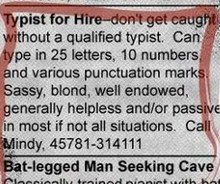Quote: "The Women's lib movement started off like ours, with some legitimate grievances and a desire to right them."
That is one of the most dangerous and destructive myths of our time. Virtually all the early names of "Women's Lib" - Friedan, Steinem, DeBeauvior - were dedicated radical Marxists, or virulent man-hating lesbians like Kate Millet and Valerie Solanis.
I have a copy of The Feminine Mystique that I purchased and read (if I have your age right) 2 years before you were born. This is what is says on the cover: "Today American women are waking up to the fact that they have been sold into virtual slavery by a lie invented and marketed by men."
Another interesting tidbit from the cover - "For years American women have been assured that they had all they needed to be perfectly happy and fulfilled - hard working husbands, lovely houses, and wonderful babies, babies, babies."
Fast forward the 41 years since TFM came out and what do we have? Women who want (high-earning) husbands, lovely houses, and babies enough to have them as single mothers or go to court and fight their husbands tooth and nail for those babies, babies, babies. Gee, the brainwashing they have endured to make them want these things must have been subtle indeed in a country swimming in feminist propaganda.
Feminism has always been about women blaming men for the choices they made and how things worked out as a result of those choices. Frieden goes into a huge long diatribe about the contents of women's magazines without ever once seeming to grasp the notion that women were buying the things voluntarily.
DeBeauvior, in a now very famous quote, even went so far as to state that she believed no woman should be given the choice to stay at home and raise her children, because too many women would make that choice. Thus, feminism has actually been the opposite of what its PR has said - it is about giving women fewer choices rather than more choices
-----------
"No woman should be authorized to stay at home and raise her children. Society should be totally different. Women should not have that choice, precisely because if there is such a choice, too many women will make that one." -- Interview with Simone de Beauvoir, "Sex, Society, and the Female Dilemma," Saturday Review, June 14, 1975, p.18
-----------
I just think we need to be very careful in identifying the social movements that are being discussed. The movement for suffrage accomplished its goal, and then had no further reason to exist. When you called it "Women's Lib" I assumed you were referring to the movement which sprang up in the 60s based on victimhood. As far as I know, that term was never used to describe the push for voting rights.
I think it also clouds the issue terribly to over-simplify the issues which went into voting rights. The current notion of popular democracy was considered and specifically rejected by the architects of the US government. It was intended as a Republic and federation of States, and was never intended to be as powerful as it has become. One of the framers of the constition even went on record as saying that a pure democracy will always degenerate to mob rule. Institutions such as the Electoral College were designed specifically to moderate the effects of large population centers being able to impose their collective preferences on less populous states.
Just as today we are told that driving is a privilege not a right, the franchise was never intended to be handed out to anyone and everyone simply because they happened to be born here. At the very beginning, only landowners were given the vote, because they not only had a vested stake in the community, but they were also instrumental in building it. Interestingly, the "Poll Tax" which was later used to deny people the ability to vote was originally conceived as a way to expand voting rights beyond land and business owners. It was a measure of fiscal responsibility and success very similar to the requirement today in many states that one cannot license a car without proof of insurance or other demonstrable means of fiscal responsibility.
What women had to do was to convince those in control of the system that they (women) would use the franchise wisely and responsibly, and not frivolously by doing things like voting for a candidate because they liked his hair or the way he kissed his wife. In short, there was a sort of voting test much like today's driving tests which serve the purpose of testing certain basic minimal qualifications and competencies required for a complex process.
Such principles were not directed toward women specifically, because the franchise was also denied to most convicted felons, transients, and people who could not read well enough to know what the ballot said. The concept of women as flightly, irrational, and irresponsible certainly has more than enough proof today to make the point that concerns over whether they would use the franchise responsibly were probably quite justified in the 19th century. The overall risks and fragility of the country were certainly much greater then than they are today.
I know it is a sound-bite world, but I think we do need to be very careful in how we state our points. The "Women's Lib" movement of the last part of the 20th century relies heavily on the suffrage movement for its legitimacy, but I believe there is no continuity at all between them aside from the fact that they are both about women.
--------------------------------------------------------------------------------
Further Reading:
Republic versus Democracy?
---------------------------------------------------------------------------------
Previous Zenpriest Index Next
Search This Blog
The Jiggly Room
Polk High
The Encyclopedia Marxofeminist

Feminist "Equality" Includes The Loss of Free Speech
Sheeple Fighting Back!
- Black Sheep - You Tube (2min)
- Symantec (SYMC - NASDAQ) Downgraded to "Sell"
- Problems With Norton Internet Security?
- Cypress CEO Responds to Nun's Urging a "Politically Correct" Board Make-Up
- Do You Believe Women Have the Right to Free Speech?
- Canadian Feminists Getting Worried?
- Seven Ways To Get Traffic Without Google
Not All Women Are Like That! (NAWALT)
Myths, Legends & Religions

You are not god. Learn to observe without judging.

- Cypress CEO Responds to Nun's Urging a 'Politically Correct' Board Make-up
- The Baby Bomb: How the Boomers were Used to Demolish a Culture
- Statement of Bill Wood to the Committee on Ways and Means
- Why Did Feminists Attack the Family? -- by Heretical Sex
- Political Correctness - The Revenge of Marxism -- by Baron Bodissey
- Are Americans Practicing Communism? (The Ten Planks of the Communist Manifesto)
"We can't expect the American People to jump from Capitalism to Communism, but we can assist their elected leaders in giving them small doses of Socialism, until they awaken one day to find that they have Communism." -- Nikita Krushchev

THE ANIMAL FARM REALITY OF "FEMINIST EQUALITY:"
"Differences [between men and women], including the products of social inequality, MAKE UNEQUAL TREATMENT NOT UNEQUAL AT ALL." -- Catharine MacKinnon, "Reflections on Sex Equality Under Law," Yale Law Journal, 1991
Blog Archive
-
▼
2002
(67)
-
▼
January
(31)
- Zenpriest #31 - If Things You See Just Don't Seem ...
- Zenpriest #30 - Gurl Math
- Zenpriest #29 - The Future's Cultural Time-bombs
- Zenpriest #28 - Ethical Sociopaths
- Zenpriest #27 - Ignoring Women
- Zenpriest #26 - Second Wavers vs. The Suffragettes
- Zenpriest #25 - The 5 Best Arguments for Staying S...
- Zenpriest #24 - If a Woman Goes Into a Bar Wearing...
- Zenpriest #23 - Marriage Is Becoming the Social Ed...
- Zenpriest #22 - "Broken" Men and Women's "Fixing" ...
- Zenpriest #21 - The Terrible Twos
- Zenpriest #20 - There Is Nothing More Lonely Than ...
- Zenpriest #19 - How Women Keep Score
- Zenpriest #18 - The Designated Initiator
- Zenpriest #17 - "e-kwuhl pay fer e-kwuhl werk"
- Zenpriest #16 - The Gender War
- Zenpriest #15 - Regarding the Marriage Strike
- Zenpriest #14 - If a Man Speaks in the Forest, and...
- Zenpriest #13 - Prove to Me You Aren't a Bad Guy!
- Zenpriest #12 - Happiness
- Zenpriest #11 - Emotional Deficit
- Zenpriest #10 - When Men's Trust Is Gone
- Zenpriest #9 - The 90's were the Make It or Break ...
- Zenpriest #8 - The Big Truth
- Zenpriest #7 - Women's Aggression
- Zenpriest #6 - The Death of Marriage
- Zenpriest #5 - Addicted to Attention
- Zenpriest #4 - The Two Faces of Masculinity
- Zenpriest #3 - Repressing Sexuality
- Zenpriest # 2 - You Can't Change a Pickle Back Int...
- Zenpriest #1 - Women Raised Without Fathers
-
▼
January
(31)

"Only an armed people can be the real bulwark of popular liberty." -- V.I. Lenin
Repeal the Canadian Gun Registry

"A system of licensing and registration is the perfect device to deny gun ownership to the bourgeoisie." -- V.I. Lenin
"We shall destroy you from within!" -- Nikita Krushchev, during the Kitchen Debate, 1959
"Self Made Man" - Sculpture by Bobbie Carlyle
Websites
The Demographic Trap

"Destroy the family, you destroy the country." -- V.I. Lenin
"America is like a healthy body and its resistance is threefold: its patriotism, its morality, and its spiritual life. If we can undermine these three areas, America will collapse from within." -- Josef Stalin
Back to the Bible
A Non-Bible Thumper Point of View
"The aim of socialism is not only to abolish the present division of mankind into smaller states and all-national isolation, not only to bring the nations closer to each other, but also to merge them." -- V.I. Lenin
No Thanks - We'd Rather Be Canadian!
Man-Made Global Warming is a Hoax being used to bring about Global Communism (Globalization)

"Every collectivist revolution rides in on a Trojan horse of 'emergency'. It was the tactic of Lenin, Hitler, and Mussolini. In the collectivist sweep over a dozen minor countries of Europe, it was the cry of men striving to get on horseback. And 'emergency' became the justification of the subsequent steps. This technique of creating emergency is the greatest achievement that demagoguery attains." -- Herbert Hoover
Beware the Cultural Marxism of Environmentalists
"The threat of environmental crisis will be the 'international disaster key' that will unlock the New World Order." -- Mikhail Gorbachev, quoted in "A Special Report: The Wildlands Project Unleashes Its War On Mankind", by Marilyn Brannan, Associate Editor, Monetary & Economic Review, 1996, p. 5

ABOLISH THE UNITED NATIONS
The Marxism of Multi-Culturalism

"Tolerance is how far a mechanical part can deviate from the norm before it screws up the entire machine." -- Any Mechanic
The Grinch That Steals Children's Souls

"Give us the child for 8 years and it will be Bolshevik forever." -- V.I. Lenin
"We must declare openly what is concealed, namely, the political function of the school...It is to construct communist society." -- V.I. Lenin
Extra, Extra!



"The oppressed are allowed once every few years to decide which particular representatives of the oppressing class are to represent them." -- Karl Marx
The Liberal Party of Canada = Cultural Marxist Agenda
- The Real Pierre Trudeau: Father of Canada's Permissive Society -- by Steve Jalsevac
- Pierre Elliot Trudeau - Cultural Marxist Wrapped In a Canadian Flag
- The Multi-Tasking Pink Proletariat
- The Right Dishonourable Paul Martin Wants Canadians to "Give Up A Little Of Our Sovereignty To Make The World Work." -- YouTube 2:38 (Maybe We Should Lock Him Up To Make Canada Work!)
Congratulations, Karl Marx!

Marxism Links (For Researching)

- A Brief Overview of Marxism: "Communist (Community) Oriented Policing" - by Phil Worts
- Antonio Gramsci - Collected Works, including the Prison Notebooks
- Antonio Gramsci's Life & His Marxist Theories Explained
- Communist Manifesto - by Karl Marx & Frederick Engels
- Herbert Marcuse Official Homepage
- Herbert Marcuse, Haters of
- Marxists Internet Archive
- The Conflict Tradition
- Women and Marxism
Rule by Science

Philosophy Corner

“Dialectical thought is related to vulgar thinking in the same way that a motion picture is related to a still photograph. The motion picture does not outlaw the still photograph but combines a series of them according to the laws of motion.” -- Leon Trotsky
Dialectical Thought is a Cornerstone of Marxism, and Feminism (Because They Are One In the Same)
The Marxist Dialectic's Zig-Zag

Wishing to advance in a room full of people, I do not walk through the aisle and straight toward my goal. Nor do I move slowly through the crowd shaking hands with friends and acquaintences, discussing points of interest, gradually nearing the objective. The dialectical pathway is different. It consists of a resolute forward advance followed by an abrubt turn and retreat. Having retreated a distance there is another turn and advance. Through a series of forwardbackward steps the goal is approached. To advance thus is to advance dialectically. The Communist goal is fixed and changeless, but their direction of advance reverses itself from time to time. They approach their goal by going directly away from it a considerable portion of the time. Lenin wrote the textbook, One Step Forward, Two Steps Back. Chinese Communist schoolchildren are taught to do the dialectical march taking three steps forward and two steps back. If we judge where the Communists are going by the direction in which they are moving we will obviously be deceived -- Dr. Fred Schwarz, President of Christian Anti-Communism Crusade
Critical Theory

All's Fair In Love and War


The Matriarchy Lives! (Click Picture)

"I am most anxious to enlist everyone who can speak or write to join in checking this mad, wicked folly of 'Women's Rights', with all its attendant horrors, on which her poor feeble sex is bent, forgetting every sense of womanly feelings and propriety. Feminists ought to get a good whipping. Were woman to 'unsex' themselves by claiming equality with men, they would become the most hateful, heathen and disgusting of beings, and would surely perish without male protection." -- Queen Victoria, 1870


Please Give Manginas the Respect They Deserve: NONE!

























